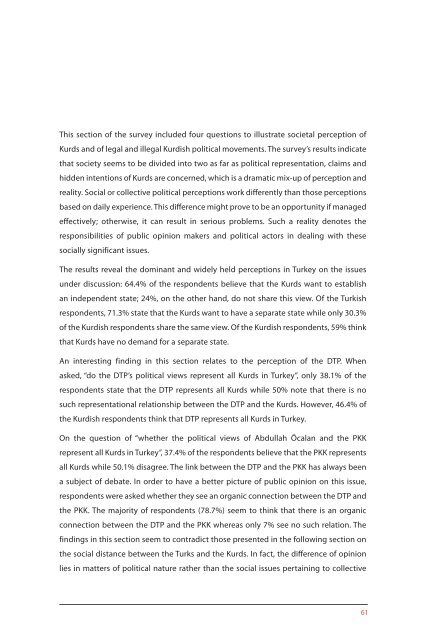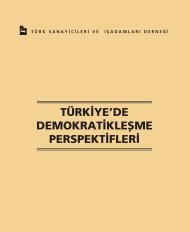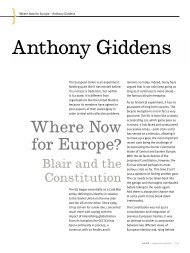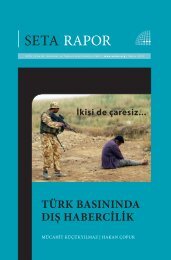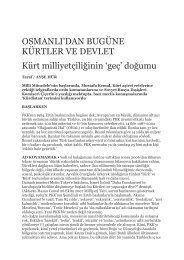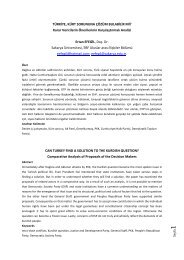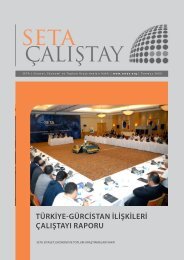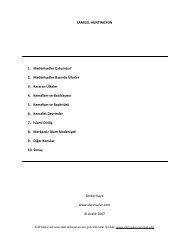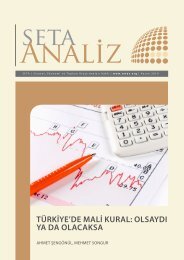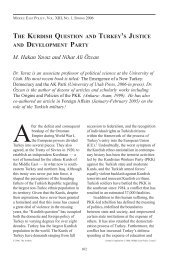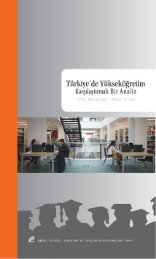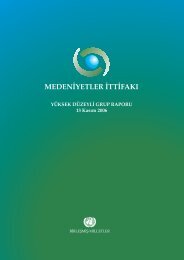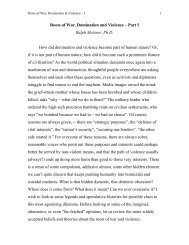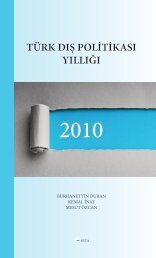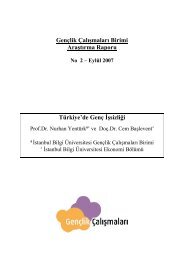public perception of the kurdish question in turkey - the SETA ...
public perception of the kurdish question in turkey - the SETA ...
public perception of the kurdish question in turkey - the SETA ...
Create successful ePaper yourself
Turn your PDF publications into a flip-book with our unique Google optimized e-Paper software.
P u b l i c P e r c e p t i o n o f t h e K u r d i s h Q u e s t i o n i n T u r k e y<br />
This section <strong>of</strong> <strong>the</strong> survey <strong>in</strong>cluded four <strong>question</strong>s to illustrate societal <strong>perception</strong> <strong>of</strong><br />
Kurds and <strong>of</strong> legal and illegal Kurdish political movements. The survey’s results <strong>in</strong>dicate<br />
that society seems to be divided <strong>in</strong>to two as far as political representation, claims and<br />
hidden <strong>in</strong>tentions <strong>of</strong> Kurds are concerned, which is a dramatic mix-up <strong>of</strong> <strong>perception</strong> and<br />
reality. Social or collective political <strong>perception</strong>s work differently than those <strong>perception</strong>s<br />
based on daily experience. This difference might prove to be an opportunity if managed<br />
effectively; o<strong>the</strong>rwise, it can result <strong>in</strong> serious problems. Such a reality denotes <strong>the</strong><br />
responsibilities <strong>of</strong> <strong>public</strong> op<strong>in</strong>ion makers and political actors <strong>in</strong> deal<strong>in</strong>g with <strong>the</strong>se<br />
socially significant issues.<br />
The results reveal <strong>the</strong> dom<strong>in</strong>ant and widely held <strong>perception</strong>s <strong>in</strong> Turkey on <strong>the</strong> issues<br />
under discussion: 64.4% <strong>of</strong> <strong>the</strong> respondents believe that <strong>the</strong> Kurds want to establish<br />
an <strong>in</strong>dependent state; 24%, on <strong>the</strong> o<strong>the</strong>r hand, do not share this view. Of <strong>the</strong> Turkish<br />
respondents, 71.3% state that <strong>the</strong> Kurds want to have a separate state while only 30.3%<br />
<strong>of</strong> <strong>the</strong> Kurdish respondents share <strong>the</strong> same view. Of <strong>the</strong> Kurdish respondents, 59% th<strong>in</strong>k<br />
that Kurds have no demand for a separate state.<br />
An <strong>in</strong>terest<strong>in</strong>g f<strong>in</strong>d<strong>in</strong>g <strong>in</strong> this section relates to <strong>the</strong> <strong>perception</strong> <strong>of</strong> <strong>the</strong> DTP. When<br />
asked, “do <strong>the</strong> DTP’s political views represent all Kurds <strong>in</strong> Turkey”, only 38.1% <strong>of</strong> <strong>the</strong><br />
respondents state that <strong>the</strong> DTP represents all Kurds while 50% note that <strong>the</strong>re is no<br />
such representational relationship between <strong>the</strong> DTP and <strong>the</strong> Kurds. However, 46.4% <strong>of</strong><br />
<strong>the</strong> Kurdish respondents th<strong>in</strong>k that DTP represents all Kurds <strong>in</strong> Turkey.<br />
On <strong>the</strong> <strong>question</strong> <strong>of</strong> “whe<strong>the</strong>r <strong>the</strong> political views <strong>of</strong> Abdullah Öcalan and <strong>the</strong> PKK<br />
represent all Kurds <strong>in</strong> Turkey”, 37.4% <strong>of</strong> <strong>the</strong> respondents believe that <strong>the</strong> PKK represents<br />
all Kurds while 50.1% disagree. The l<strong>in</strong>k between <strong>the</strong> DTP and <strong>the</strong> PKK has always been<br />
a subject <strong>of</strong> debate. In order to have a better picture <strong>of</strong> <strong>public</strong> op<strong>in</strong>ion on this issue,<br />
respondents were asked whe<strong>the</strong>r <strong>the</strong>y see an organic connection between <strong>the</strong> DTP and<br />
<strong>the</strong> PKK. The majority <strong>of</strong> respondents (78.7%) seem to th<strong>in</strong>k that <strong>the</strong>re is an organic<br />
connection between <strong>the</strong> DTP and <strong>the</strong> PKK whereas only 7% see no such relation. The<br />
f<strong>in</strong>d<strong>in</strong>gs <strong>in</strong> this section seem to contradict those presented <strong>in</strong> <strong>the</strong> follow<strong>in</strong>g section on<br />
<strong>the</strong> social distance between <strong>the</strong> Turks and <strong>the</strong> Kurds. In fact, <strong>the</strong> difference <strong>of</strong> op<strong>in</strong>ion<br />
lies <strong>in</strong> matters <strong>of</strong> political nature ra<strong>the</strong>r than <strong>the</strong> social issues perta<strong>in</strong><strong>in</strong>g to collective<br />
61


